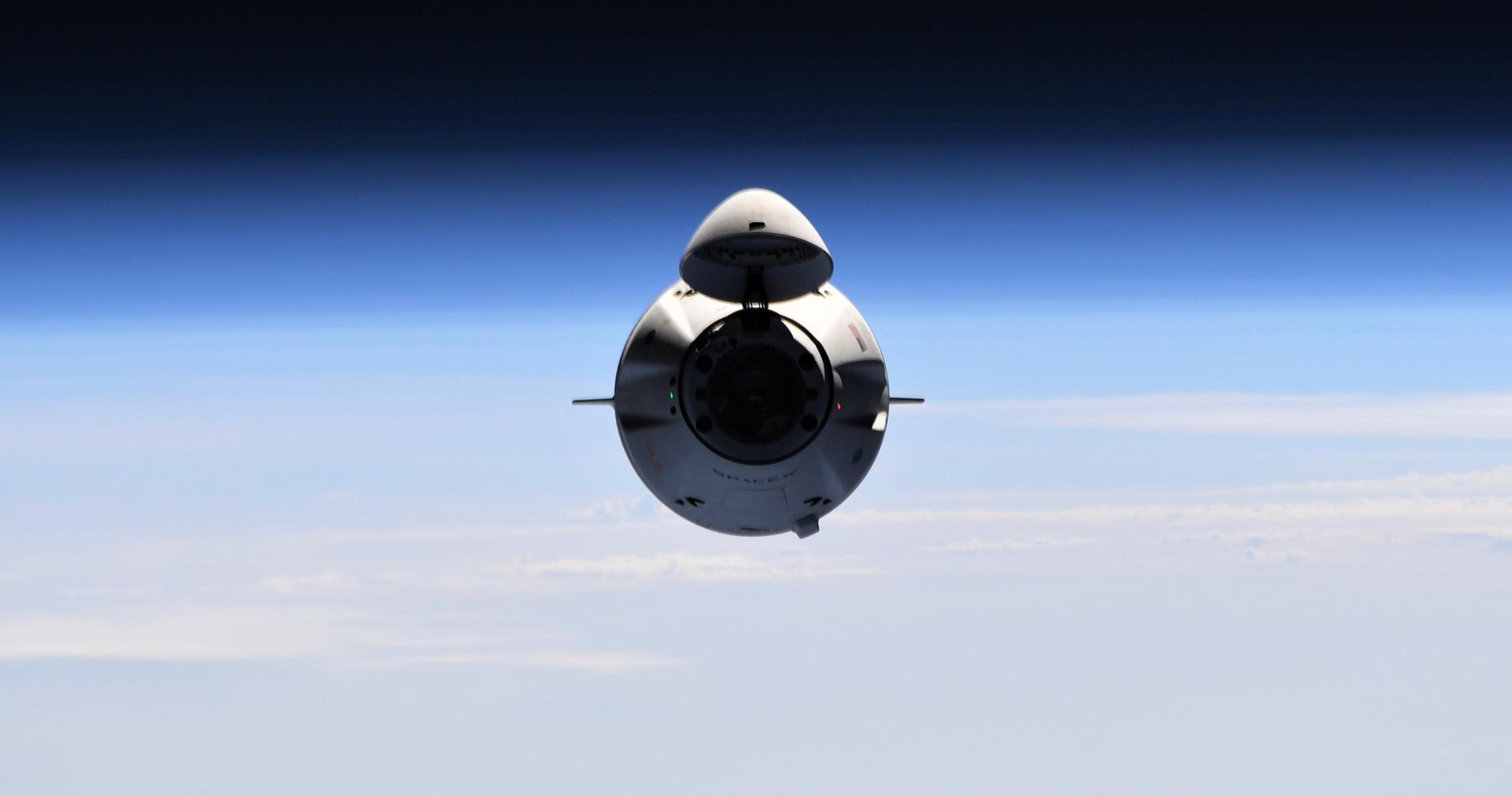
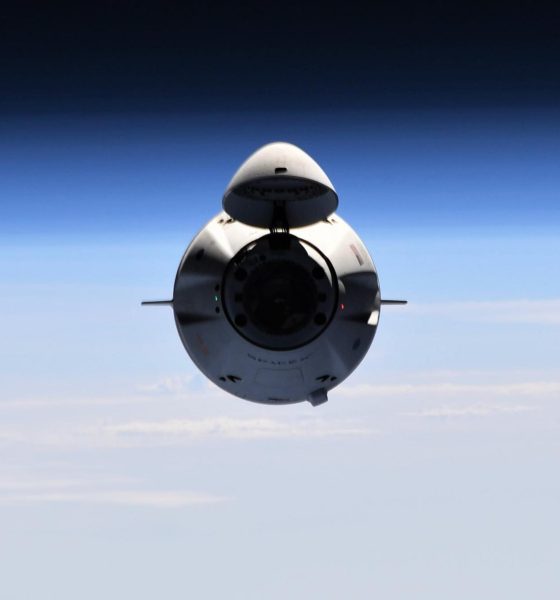
News
SpaceX Cargo Dragon spacecraft heads home after a month in orbit
After more than a month in orbit, SpaceX’s second upgraded Cargo Dragon spacecraft has undocked from the International Space Station (ISS) on its way back to Earth.
Delayed several days by stormy conditions in the Gulf of Mexico, the effects of Hurricane Elsa thankfully waned enough for NASA and SpaceX to proceed with the second autonomous undocking of a Cargo Dragon on July 8th. Originally scheduled on Tuesday, Dragon’s flawless Thursday departure leaves the spacecraft on track to reenter Earth’s atmosphere and splash down off of Florida’s West Coast in the Gulf of Mexico around 11:29 pm EDT (UTC-4) on Friday, July 9th.
Thanks to SpaceX’s growing expertise with Dragon 2 recovery operations and the CRS-22 mission’s preferred recovery location, science experiments among the more than two tons (~4400 lb) of cargo returning to Earth could be in the hands of their respective scientists mere hours after splashdown.
SpaceX Dragon and payload fairing recovery vessel GO Navigator departed its Port Canaveral berth on July 5th and ultimately rerouted to Tampa Bay after weather delays were confirmed. The ship was able to leave its temporary haven on July 8th and should arrive at the recovery zone around 100-150 km south of Tallahassee, Florida hours before Dragon’s planned reentry.
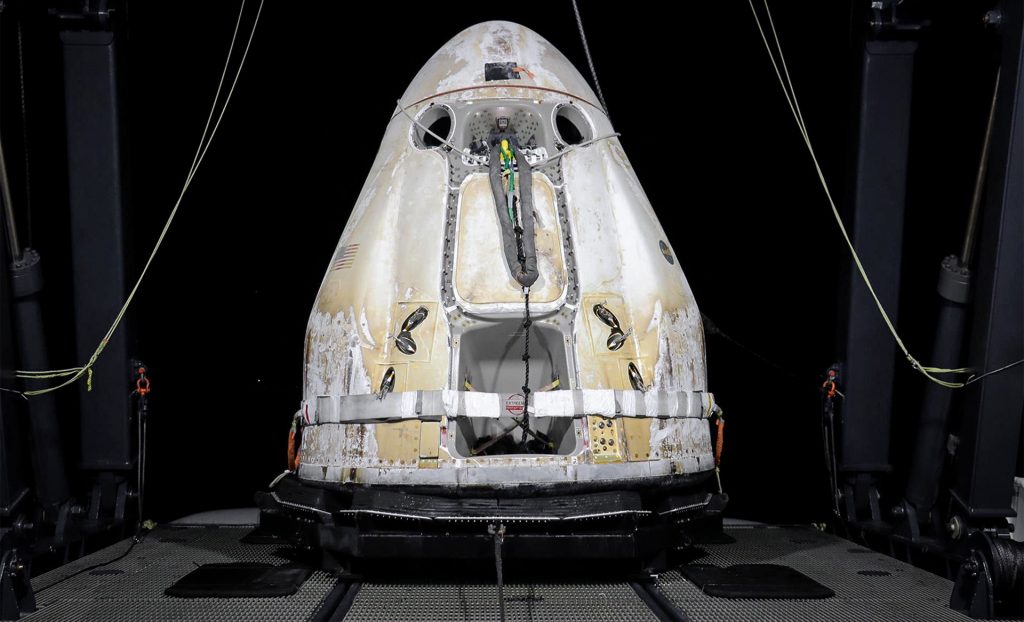
CRS-22’s reentry, descent, and splashdown is set to occur a few days shy of six months after Cargo Dragon 2’s first successful recovery, which was completed on January 13th. Assuming that CRS-22 ultimately marks SpaceX’s 24th consecutively successful orbital spacecraft recovery, the company’s next Dragon launch – CRS-23 – is scheduled to lift off as early as August 18th, 2021, carrying another wealth of cargo to the International Space Station (ISS).
Cargo Dragon 2’s third launch is expected to occur just one week after Northrop Grumman’s (formerly Orbital ATK) 16th expendable Cygnus resupply mission, which is set to lift off on an Antares rocket no earlier than (NET) August 10th. Cygnus’ NG-16 mission is itself scheduled to launch just 11 days after Boeing’s Starliner crew capsule is set to attempt its second uncrewed mission to the ISS on July 30th. Deemed an Orbital Flight Test, OFT-1 almost ended in catastrophe twice in the handful of hours Starliner was aloft in December 2019. A variety major software bugs and development failures ultimately caused an abort almost the second the spacecraft deployed from ULA’s Atlas V rocket.
In September, a flight-proven SpaceX Crew Dragon is expected to support the world’s first fully private crewed launch to orbit, carrying four passengers as part of billionaire Jared Isaacman’s Inspiration4 mission. As early as late October, SpaceX could launch another four astronauts on Crew-4, the company’s fourth operational space station ferry mission for NASA. Finally, another Cargo Dragon 2 spacecraft is scheduled to fly on CRS-24 in December 2021 – the seventh Dragon launch in 12 months if schedules hold.

Elon Musk
California city weighs banning Elon Musk companies like Tesla and SpaceX
A resolution draft titled, “Resolution Ending Engagement With Elon Musk-Controlled Companies and To Encourage CalPERS To Divest Stock In These Companies,” alleges that Musk “has engaged in business practices that are alleged to include violations of labor laws, environmental regulations, workplace safety standards, and regulatory noncompliance.”
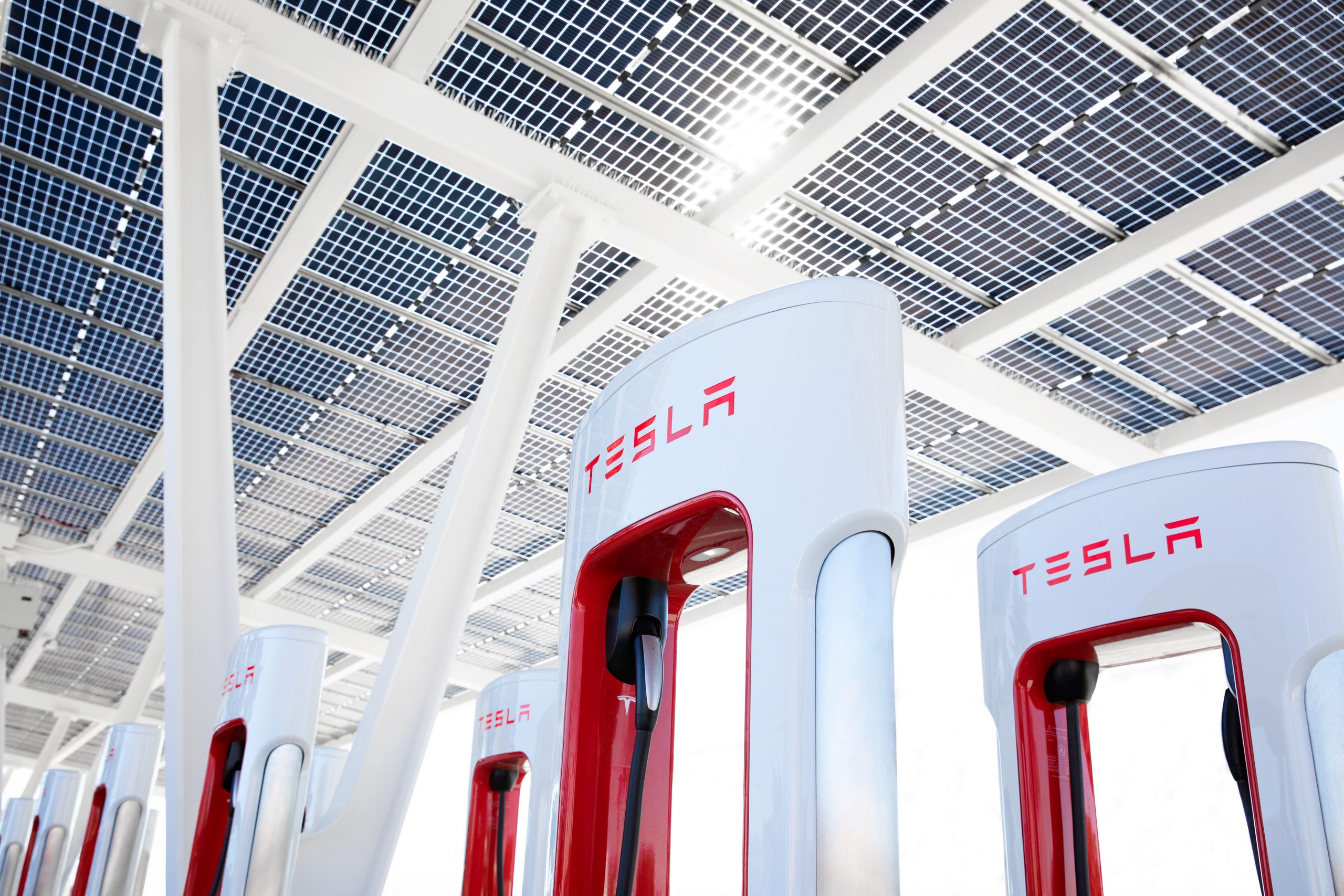
A California City Council is planning to weigh whether it would adopt a resolution that would place a ban on its engagement with Elon Musk companies, like Tesla and SpaceX.
The City of Davis, California, will have its City Council weigh a new proposal that would adopt a resolution “to divest from companies owned and/or controlled by Elon Musk.”
This would include a divestment proposal to encourage CalPERS, the California Public Employees Retirement System, to divest from stock in any Musk company.
A resolution draft titled, “Resolution Ending Engagement With Elon Musk-Controlled Companies and To Encourage CalPERS To Divest Stock In These Companies,” alleges that Musk “has engaged in business practices that are alleged to include violations of labor laws, environmental regulations, workplace safety standards, and regulatory noncompliance.”
It claims that Musk “has used his influence and corporate platforms to promote political ideologies and activities that threaten democratic norms and institutions, including campaign finance activities that raise ethical and legal concerns.”
If adopted, Davis would bar the city from entering into any new contracts or purchasing agreements with any company owned or controlled by Elon Musk. It also says it will not consider utilizing Tesla Robotaxis.
Hotel owner tears down Tesla chargers in frustration over Musk’s politics
A staff report on the proposal claims there is “no immediate budgetary impact.” However, a move like this would only impact its residents, especially with Tesla, as the Supercharger Network is open to all electric vehicle manufacturers. It is also extremely reliable and widespread.
Regarding the divestment request to CalPERS, it would not be surprising to see the firm make the move. Although it voted against Musk’s compensation package last year, the firm has no issue continuing to make money off of Tesla’s performance on Wall Street.
The decision to avoid Musk companies will be considered this evening at the City Council meeting.
The report comes from Davis Vanguard.
It is no secret that Musk’s political involvement, especially during the most recent Presidential Election, ruffled some feathers. Other cities considered similar options, like the City of Baltimore, which “decided to go in another direction” after awarding Tesla a $5 million contract for a fleet of EVs for city employees.
News
Tesla launches new Model 3 financing deal with awesome savings
Tesla is now offering a 0.99% APR financing option for all new Model 3 orders in the United States, and it applies to all loan terms of up to 72 months.
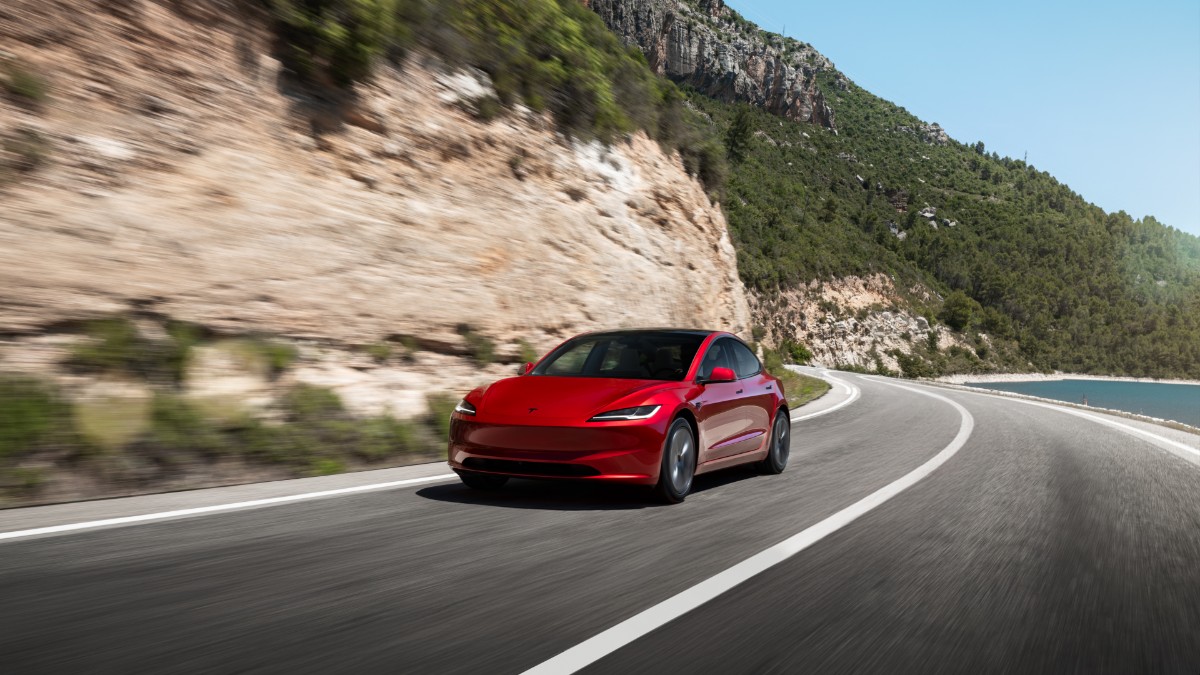
Tesla has launched a new Model 3 financing deal in the United States that brings awesome savings. The deal looks to move more of the company’s mass-market sedan as it is the second-most popular vehicle Tesla offers, behind its sibling, the Model Y.
Tesla is now offering a 0.99% APR financing option for all new Model 3 orders in the United States, and it applies to all loan terms of up to 72 months.
It includes three Model 3 configurations, including the Model 3 Performance. The rate applies to:
- Model 3 Premium Rear-Wheel-Drive
- Model 3 Premium All-Wheel-Drive
- Model 3 Performance
The previous APR offer was 2.99%.
NEWS: Tesla has introduced 0.99% APR financing for all new Model 3 orders in the U.S. (applies to loan terms of up to 72 months).
This includes:
• Model 3 RWD
• Model 3 Premium RWD
• Model 3 Premium AWD
• Model 3 PerformanceTesla was previously offering 2.99% APR. pic.twitter.com/A1ZS25C9gM
— Sawyer Merritt (@SawyerMerritt) February 15, 2026
Tesla routinely utilizes low-interest offers to help move vehicles, especially as the rates can help get people to payments that are more comfortable with their monthly budgets. Along with other savings, like those on maintenance and gas, this is another way Tesla pushes savings to customers.
The company had offered a similar program in China on the Model 3 and Model Y vehicles, but it had ended on January 31.
The Model 3 was the second-best-selling electric vehicle in the United States in 2025, trailing only the Model Y. According to automotive data provided by Cox, Tesla sold 192,440 units last year of the all-electric sedan. The Model Y sold 357,528 units.
News
Tesla hasn’t adopted Apple CarPlay yet for this shocking reason
Many Apple and iPhone users have wanted the addition, especially to utilize third-party Navigation apps like Waze, which is a popular alternative. Getting apps outside of Tesla’s Navigation to work with its Full Self-Driving suite seems to be a potential issue the company will have to work through as well.
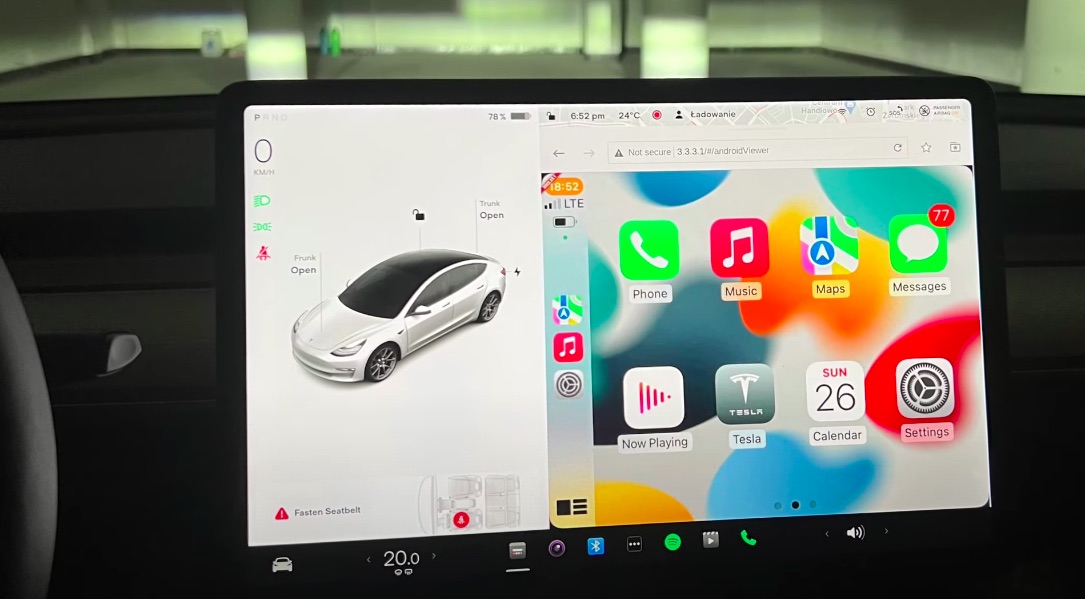
Perhaps one of the most requested features for Tesla vehicles by owners is the addition of Apple CarPlay. It sounds like the company wants to bring the popular UI to its cars, but there are a few bottlenecks preventing it from doing so.
The biggest reason why CarPlay has not made its way to Teslas yet might shock you.
According to Bloomberg‘s Mark Gurman, Tesla is still working on bringing CarPlay to its vehicles. There are two primary reasons why Tesla has not done it quite yet: App compatibility issues and, most importantly, there are incredibly low adoption rates of iOS 26.
Tesla’s Apple CarPlay ambitions are not dead, they’re still in the works
iOS 26 is Apple’s most recent software version, which was released back in September 2025. It introduced a major redesign to the overall operating system, especially its aesthetic, with the rollout of “Liquid Glass.”
However, despite the many changes and updates, Apple users have not been too keen on the iOS 26 update, and the low adoption rates have been a major sticking point for Tesla as it looks to develop a potential alternative for its in-house UI.
It was first rumored that Tesla was planning to bring CarPlay out in its cars late last year. Many Apple and iPhone users have wanted the addition, especially to utilize third-party Navigation apps like Waze, which is a popular alternative. Getting apps outside of Tesla’s Navigation to work with its Full Self-Driving suite seems to be a potential issue the company will have to work through as well.
According to the report, Tesla asked Apple to make some changes to improve compatibility between its software and Apple Maps:
“Tesla asked Apple to make engineering changes to Maps to improve compatibility. The iPhone maker agreed and implemented the adjustments in a bug fix update to iOS 26 and the latest version of CarPlay.”
Gurman also said that there were some issues with turn-by-turn guidance from Tesla’s maps app, and it did not properly sync up with Apple Maps during FSD operation. This is something that needs to be resolved before it is rolled out.
There is no listed launch date, nor has there been any coding revealed that would indicate Apple CarPlay is close to being launched within Tesla vehicles.








